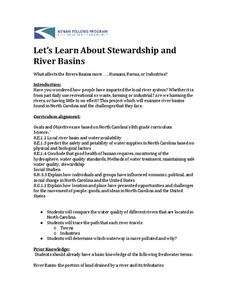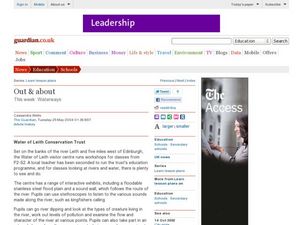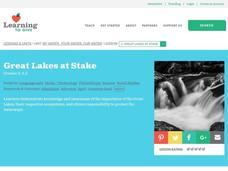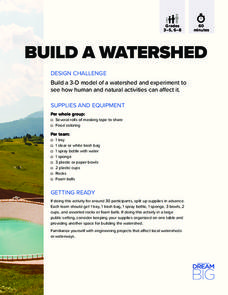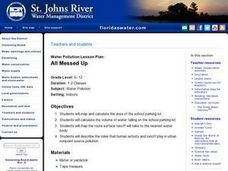US Environmental Protection Agency
Non-Point Source Pollution
Investigate the different types of pollution that storm drain runoff carries into oceans, lakes, rivers, and streams with this class demonstration. Using an aquarium and an assortment of everyday items that contaminants like motor oil,...
Curated OER
Point- vs. Non-point Pollution
Students differentiate between point and non-point pollution and determine how the different types of pollution are harmful to aquatic ecosystems. They complete a series of tests on a sample of "polluted" water and a sample of "pure" water.
Curated OER
Water Pollution Lesson Plan: All Messed Up
Students map and calculate the area of the school parking lot and then the volume of water falling on the school parking lot. They map the route surface runoff will take to the nearest water body and describe the roles that human...
Kenan Fellows
Let's Learn About Stewardship and River Basins
What does it mean to be a good steward? Middle school environmentalists learn to care for their state's waterways through research, a guest speaker, and poster activity. Groups must locate and learn more about a river basin and the human...
Curated OER
Out & About: Waterways
Students visit science museums. In this hands-on science lesson, students visit the Leith Conservation Trust, Catalyst, and the River and Rowing Museum in person or online to study Britain's waterways.
Curated OER
Water Pollution Experiments
Fifth graders conduct experiments in simulated water pollution using a box of items to hold "pollutants"and an aquarium, representing a waterway. They observe how "rain" from a watering can poured into the box washes the pollutants into...
Curated OER
Non-Point Source Pollution
Learners study non-point source pollution. They research the concept of bio-degradation and/or Nutrients/Fertilizers and discuss how non-point source pollution impacts the environment. Afterwards, they participate in an interactive...
Curated OER
Water - Our Future
How is it that water that falls as rain ends up coming out of the tap on our sinks? Learners trace water's journey and examine how along the way pollutants make their way into the water supply. They conduct experiments, use the Internet...
National Nanotechnology Infrastructure Network
How Can Nanoparticles Move from Land to Ocean?
Investigate the migration of the nanoparticle from land to water! A lab investigation asks budding scientists to simulate runoff. Testing water samples before and after the simulation leads individuals to make conclusions about pollution...
Curated OER
Keeping our Water Clean
Second graders discuss how our actions impact the quality of water. In this environmental science lesson, 2nd graders watch a short film and discuss the problem of polluted water. Students are then divided into groups and record their...
Curated OER
Super Stream Keeper's
Students are introduced to Delaware's waterways as precious resources used for drinking water, water for agricultural and industrial uses, recreational areas, and as habitats for wildlife. They are introduced to wastewater discharges,...
Curated OER
Stream Table
Students explore channelization, riparian habitats and soil erosion to find out about the aquatic habitats in Iowa. In this aquatic habitats lesson, students define important terms and read an article about pollution. Students complete...
Curated OER
Salt Marsh in a Pan
Students create a model of a salt marsh to discover the impact of pollution and human activities on water-based habitats including bays and the ocean. They recognize the relationship between natural and developed areas. Students impact...
Curated OER
The New Haven Oyster Industry and Water Quality
Young scholars examine the different types of water pollutants and how they affect the waterways. In this environmental science lesson, students collect and interpret data from government agencies. They discuss how industrial development...
Curated OER
Water, Water Everywhere and Not a Drop to Drink
Students discuss the importance of taking care of their water supply so not only they can use it but generations in the future. In groups, they examine a real pollution scenario in which a sewer overflowed into the ground water. They use...
Curated OER
Pollution Solution
Students explore the topic of oil pollution and how it affects the global ocean. They discuss oil spills in recent history and use problem solving skills to decide what strategies could be used to actually clean up an oil spill. Students...
Curated OER
Who Dirtied the Water?
Students develop a greater understanding and concern for the plight of our coastal waterways. Students begin to recognize that we are all partially responsible for water pollution.
Curated OER
Clean Water vs. Dirty Water
Students study the importance of clean water to the survival of organisms and what activiities and material pollute water. They measure the temperature of water samples and create a class graph.
Curated OER
Great Lakes at Stake
Students explore conservation of the Great Lakes. For this geography and ecology lesson, students identify the Great Lakes on a map and view a video depicting the history and importance of these lakes. Students work in groups to research...
Curated OER
Repopulating Michigan's Waterways
Eleventh graders identify the parts of an ecosystem and how communities change over time. For this ecology lesson students formulate a habitat restoration plan.
DiscoverE
Build a Watershed
What's the best way to learn how watersheds work? Build one! Combining engineering, the water cycle, and ecology concerns, the activity is the perfect fit for an interdisciplinary unit. Teams construct a model watershed with simple...
Curated OER
Water, Water Everywhere and Not a Drop to Drink
Students identify the different stages in the water cycle. In this environmental science lesson, students research about different water pollutants in watershed. They describe ways to purify water.
Curated OER
Abundant Lakes
Students define lake life zones. They define stormwater runoff and its effects on lakes. They identify the relationship between decaying substances and water pollution. They construct a freshwater food web.
Curated OER
All Messed Up
Pupils begin the experiment by mapping and calculating their school parking lot. They calculate the volume of water falling on the lot and map the route the water runoff takes. They discuss the roles that humans play in affecting water...





